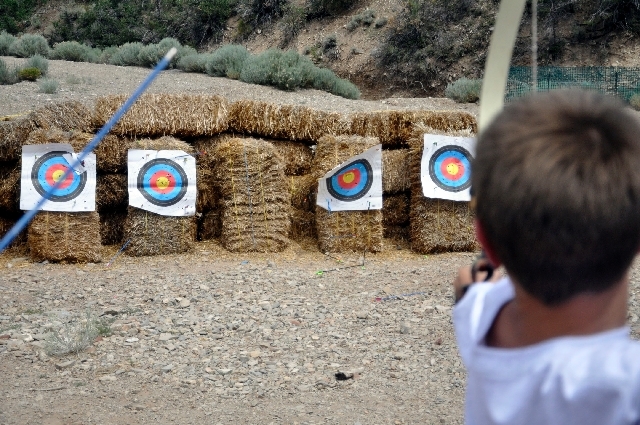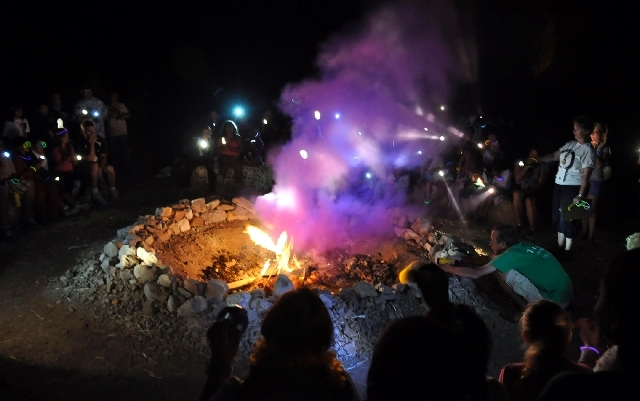Bereavement camp helps children with grieving process


When a loved one is lost, it can be the children left behind who feel lost as well.
Camp Mariposa, an annual children’s bereavement camp hosted by the nonprofit Nathan Adelson Hospice, is planned for June 28-30. The camp takes place at Camp Potosi in Lovell Canyon, about 25 miles west of Las Vegas, and is open to any child 7 to 12 who has lost a loved one. The free camp is secular, with the mission to help children process their feelings, not preach religious ideals.
Diane Smith is vice president of clinical operations for Nathan Adelson Hospice. For the past two years, she has gone to the camp and assisted the counselors and camp director. She said the camp has a two-pronged approach.
“First, we want the children to have some tools they can take with them after the camp to help them deal with grief and bereavement,” she said. “The second thing is safety and having fun at the camp. Although it’s a camp where we’re learning about healing and grief and learning to manage those (aspects), we also want it to be part of people’s lives, so actually having fun at camp as well.”
Death affects children in different ways, Smith said. Some are withdrawn. In others, behavior issues may crop up — anger, outbursts and initiating fights.
“We talk with them about how it’s OK to express their emotions,” she said. “Kids don’t know how to necessarily express (themselves) when it comes to a death … a lot of the kids who come to our camp have had a very traumatic event in their life, the death of a parent, a murder that they may have witnessed. They have a lot of complicating issues.”
Youngsters are first assigned to a healing circle, each with about 14 children. They’re assured that what they’re feeling is normal, whether sad or mad or frustrated, that it’s OK and that it’s normal to feel that way, and then they move into ways they can express those feelings — writing in a journal, talking with someone, listening to music or drawing pictures. The children are given six keys to healing — grieving, coping, remembering, supporting, love and hope. They’re asked to identify someone in their life they can turn to, a support person who’ll be there when they need to talk.
“I think some of these kids have been told, ‘Get over it,’ ‘Stop crying’ or ‘We’re not going to talk about Daddy’s death,’ so to have the opportunity to say those things, how they’re feeling out loud for the first time for some of these kids, is very new to them,” said Patty Fitzpatrick, grief facilitator and the hospice chaplain. “Others come from a family where they talk to their (deceased) loved one on a daily basis. That’s how they process death. So, we get a wide spectrum.”
The camp addresses various emotions — anger, guilt and shame. At Camp Mariposa, the youngsters are with others who are feeling the same emotions. As a result, they form a strong bond. The camp can result in lifelong friendships.
Smith said being in nature is part of the therapy.
“You’re out in the wonderful, open (spaces) with really fresh air, in the woods, and I do think it’s helpful,” she said.
Fitzpatrick said putting the children in a new environment helps them loosen up. It’s seen as a safe place and free from daily stress. They get comfortable with their group in a short time, which allows them to open up further.
“I think about the adult grief support group that we have here, and many times men will open up and say, ‘I can’t believe I’m crying in front of strangers,’ ” Fitzpatrick said. She said adults facing a loss will often tell her to give them the five things they need to do. They approach it as a “to-do” list, as though they can tick off each one.
“Unfortunately, with grief, it doesn’t work that way,” Fitzpatrick said.
The children are hurting and often in need of a hug, she said, but in today’s politically correct consciousness, hugs are abbreviated gestures such as a shoulder squeeze, a quick side clasp or high-fives.
The camp culminates with each child writing a letter to his loved one who died. In the letter, some apologize, some pass on a message they didn’t get to express while their loved one was alive, and some just say, “I miss you.”
That letter is then fed to a bonfire, the smoke wafting away into the night, a symbolic way to let go of emotions.
“We end with hope,” Fitzpatrick said, “hope for feeling better and having a life they can live fully again.”
There is no cost. To request an application or volunteer for the camp, call 702-796-3167 or visit the Center for Compassionate Care, 4131 Swenson St., which oversees the operation.
Information can also be downloaded from nah.org.
Contact Summerlin/Summerlin South View reporter Jan Hogan at jhogan@viewnews.com or 702-387-2949.
Camp Mariposa
There is no cost for the June 28-30 bereavement camp, which is open to children ages 7 to 12 who have lost a loved one. To request an application or volunteer for the camp, call 702-796-3167 or visit the Center for Compassionate Care, 4131 Swenson St., which oversees the operation. Information can also be downloaded from nah.org.


















